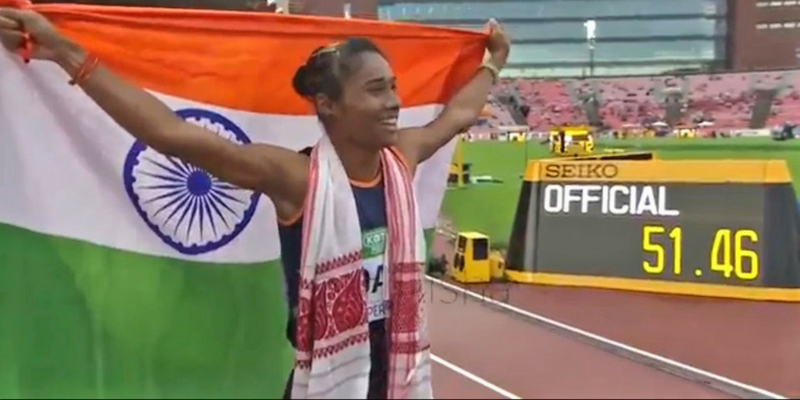Defying odds with guts and gumption, grit and determination: how Indian women came out on top at the Asian Games
Women who accounted for 28 of the total 69 medals won by India came from humble backgrounds in the Indian hinterlands. They fought with grit and determination and against all odds, to emerge winners.
Indian women went for the gold, silver and bronze as they put up one spirited performance after another in the recently concluded Asian Games in Jakarta, Indonesia.
What stood out was not just their winning spirit and determination, but each one had a backstory – girls from remote parts of India – training without proper equipment, shoes, nutrition or financial backing – fighting against all odds to make their country proud.
Whether it was Hima Das taking a well-deserved lap with the tricolour wrapped around her shoulders after winning the silver in the 400m race, or Swapna Burman who created history by becoming the first Indian heptathlete to win a gold despite a severe toothache, the Indian women kept the flag flying high, at all times.

Strength in numbers
What made this edition of the Asian Games different was not just due to a sizeable medal haul by India, but also because women accounted for 41 percent of the total tally. Out of the total 69 medals won by India cutting across the categories of gold, silver and bronze, women athletes accounted for 28.
The number of medals won by women athletes has been on the rise since the 2002 Asiad Games in Busan, South Korea. In the 2002 Busan Asian Games, the number of medals won by women athletes stood at 13 and it certainly has been a big jump.
The Indian sports contingent at the 2018 Asian Games was 572, out of which 260 were women, while men accounted for 312.
The winning women athletes at the 2018 Asiad were not just from big cities but came from the hinterlands of Assam, Orissa, Gujarat, and Haryana with many who had undergone long struggles marked by poverty and lack of opportunity.
Fighting the odds
Swapna Barman, India’s heptathlon champion at the Games, took up the sport even though running was a painful experience for her. Born with 12 toes, the 21-year-old from a small town in West Bengal practised in unheard-of conditions and made her way to the finals only to come down with a nerve-wracking toothache. But guts and gumption won over as she clinched the gold.
Athlete Hima Das’ story has been chronicled many times, and serves as a reminder of how a girl from humble beginnings sprinted her way to the top. Going by the moniker 'The Dhing Express', as she hails from Dhing in Assam, Hima won an individual silver and led the 4X400 relay team to the gold.
Sarita Gayakwad hails from Karadi Amba, a remote village in Dang District in Gujarat, with no access to roads, transportation and network. She had no resources to buy shoes, so she trained barefoot. As part of the winning 4X400m relay at the Asian Games, Sarita’s road to victory has been a long struggle.
There are many more stories – of women who battled stereotypes and societal discrimination to take up sports as a career.
Role models with a ‘hunger to win’
Nisha Millet, the former swimmer who represented India in the Sydney Olympic Games in 2000, and Arjuna Award winner, says, “Women athletes who have won medals are becoming role models and even boys are not just looking at Sachin Tendulkar but at sports stars like Neeraj Chopra and Hima Das.”
“I have so many friends telling me ‘wow, we have so many woman athletes winning medals for the country'. These are inspiring stories of those who have literally fought poverty to come up to this level,” she adds.
Ashwini Nachappa, a well-known former athlete who represented India in various sprint events, and Arjun Award winner, attributes this increased medal tally of women to a positive attitude. “Earlier there was the spirit to win, but now there is a hunger to win,” she says. Ashwini recounts how, in the past, athletes were just interested in breaking the national records, but the current crop are setting their eyes much beyond the nation’s borders.
Among the various medals won by women athletes at the 2018 Asian Games, one consistent team has been the Indian women’s relay team of 4x400 that won for the fifth time in a row. This squad comprised M R Poovamma, Hima Das, V K Vismaya and Sarita Gayakwad.
The 2018 Asiad had also other golden moments. Vinesh Phogat became the first women athlete to win the gold medal in the wrestling category. Thanks to Aamir Khan-starrer Dangal the struggles women wrestlers go through in Haryana, in a deeply patriarchal society, has come into the spotlight. Vinesh is another illustrious addition to the growing number of women athletes from the state.
More support for women in sport
The laurels won by the women athletes have set the foundation for higher glory for the country. Nisha opines that sports needs more funding not just from the government but also from the private sector. “This is the only way we can support the upcoming junior players, otherwise how will they graduate to the next level,” she asks.
Both Nisha and Ashwini commended the government’s decision to appoint former Olympian Rajyavardhan Singh Rathore as Sports Minister, which has given a boost to the segment. They feel that sports federations need to be led by sportspersons, which is currently a very small percentage. Besides, the steps taken by former sports personalities like P Gopichand, Bhaichung Bhutia or Mary Kom to start their own sports academies will provide the right platform for budding athletes and those interested in sports.
Dutee Chand, silver medallist at the Asian Games, is a case in point. She was denied permission to train at the Sports Authority of India (SAI) for extraneous reasons and Gopichand’s academy came forward to accommodate her.
Nisha feels that the grooming of future sports talent should start at the university level so that they can aspire to compete at the Olympics.
Ashwini says, “These young athletes are making history and becoming heroes. These are the kind of the stories youngsters should be reading about in their textbooks.”
(With inputs from Ayesha Roy and Kanika Mittal)







